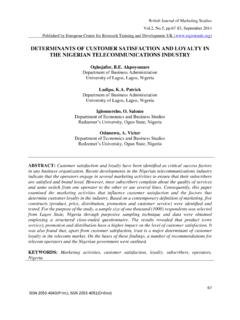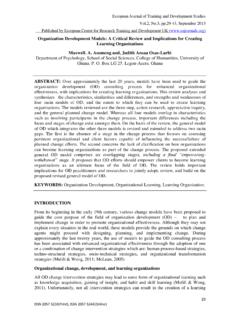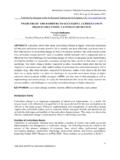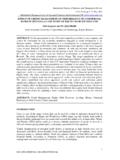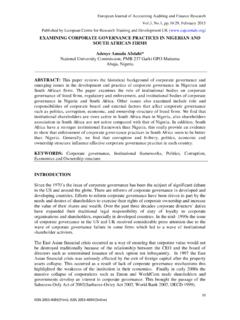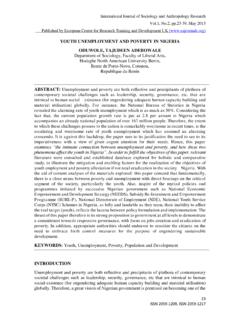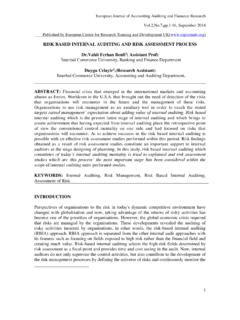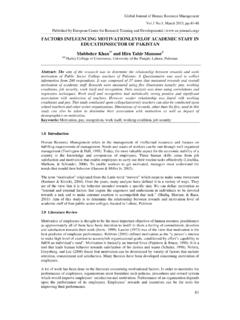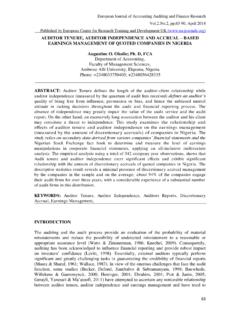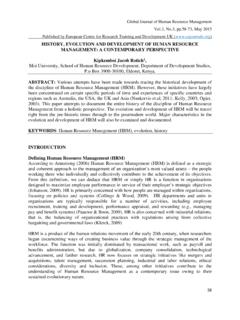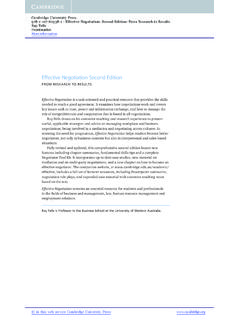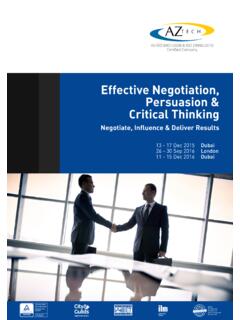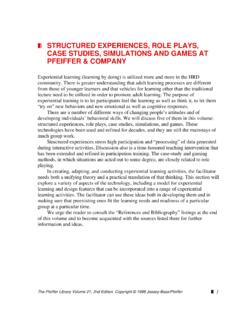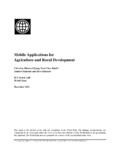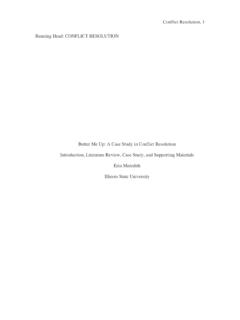Transcription of DIPLOMATIC METHODS OF CONFLICT RESOLUTION (A CASE STUDY OF ...
1 Global Journal of Politics and Law Research , , , June 2015 Published by European Centre for Research Training and Development UK ( ) 27 ISSN 2053-6321(Print), ISSN 2053-6593(Online) DIPLOMATIC METHODS OF CONFLICT RESOLUTION (A case STUDY OF ECOWAS) Livinus I. Okere ABSTRACT: The work examines Economic Community of West African States (ECOWAS) DIPLOMATIC METHODS of CONFLICT RESOLUTION in West Africa. The objectives is to ascertain how effective these METHODS have been utilized in resolving conflicts in West Africa with a view of making appropriate recommendations based on research findings on how best to employ these METHODS by the community. The work adopted the doctrinal methodology of research, mainly primary and secondary sources such as: textbooks, official documents from ECOWAS, periodicals and internet resources.
2 The work observed that these METHODS were successfully used to restore peace in Sierra Leone, Liberia, Togo, Cote d ivoire, Guinea Bissau, Senegal and Gambia. Thus, the METHODS are useful in settlement of disputes and should be encouraged because the decision is reached by the parties themselves and enforcement of such agreement may be easier. The current use of council of elders on ad-hoc basis for peaceful RESOLUTION of conflicts is not sufficient. The ECOWAS should establish Commission of Mediation, Conciliation and Arbitration as it will serve as a reminder to disputants that there is still the last opportunity to resolve their differences. Those to be appointed mediators should have good track records in terms of high level work experience and character; be endowed with negotiating skills and able to bring about peace and reconciliations that can be employed in potential CONFLICT situations.
3 KEYWORD: DIPLOMATIC METHODS , CONFLICT RESOLUTION , ECOWAS INTRODUCTION The emergence of ECOWAS has been influenced by global trends. The birth of ECOWAS was in itself a response of member countries to the challenges of globalization. On 28th May, 1975 when ECOWAS emerged in Lagos with the signing of the ECOWAS Treaty, the world was going through a crisis in international economic relations, manifested in the following key areas; falling living standards in developing countries; over-dependence of the region on the advanced economies especially the metropolis; the limited space for maneuverability by the individual developing countries on the international scene; a global system distorted by the bi-polarity divide, into which developing countries were caught.
4 A cherished and yet abused principle of national sovereignty and its linkage with national security and the inviolability of domestic jurisdiction; an accompanying paradox of sovereign equality of states and inequality in the ability to act; the realization by developing countries, especially of Africa, of the need for collective self-reliance in order to at least survive in the system and engage in it meaningfully. It is against this background that with the assistance of the UN, especially the United Nations Economic Commission for Africa (UNECA) in Addis-Ababa, a rational framework was agreed the creation of regional economic communities as a means of collective self-reliance for sustainable socio-economic development, and as building blocs of an African Economic Thus, the vision of the founding Global Journal of Politics and Law Research , , , June 2015 Published by European Centre for Research Training and Development UK ( ) 28 ISSN 2053-6321(Print), ISSN 2053-6593(Online)
5 Fathers of ECOWAS was to create a single regional economic space as a prelude to the continental one, through integration and collective self-reliance; an economic space with a single market and single currency capable of generating accelerated socio-economic development and competing more meaningfully in the global market of large trade blocks and uneven patterns of trade between the industrialized North and raw material-based economies of the South. However, it did not take long before the ECOWAS leaders realized that economic development cannot be separated from security matters. Accordingly, protocols on Non-Aggression and Mutual Assistance in Defense were adopted by ECOWAS leaders in 1978 and 1981 respectively.
6 These legal instruments were primarily designed to deal with threats emanating from outside the territorial boundaries of states, rather than from 1. Chambas, , The ECOWAS Agenda: Promoting Good Governance, Peace, Stability and Sustainable Development, NIIA Lecture Series No. 86, 2005, pp 10-11. 2. See Articles 1-4 of the Protocol Relating to Non-Aggression, 1978 and article 4(b) of the Protocol Relating to Mutual Assistance on Defense, 1981. Barely a decade after the creation of ECOWAS, conflicts emerged in Liberia and Sierra Leone as a phenomenon not confined to the borders of individual nation states, but with serious regional implications, both in their causes and effects. ECOWAS intervened in these conflicts adopting ad-hoc CONFLICT management mechanisms.
7 The new and evolving CONFLICT dynamics in the sub-region, coupled with field experience persuaded ECOWAS leaders to re-think the relationship between security and development and consequently to prioritize CONFLICT prevention in the same way as economic development and integration. Accordingly, the ECOWAS Treaty of 1975 was revised in 1993 to re-energize the integration process, factor in the peace and security sector which was previously downplayed. Thus, member states of the community undertook to co-operate with the community in establishing and strengthening appropriate mechanisms for the timely prevention and RESOLUTION of intra-state and inter-state In compliance with the provision of the treaty, ECOWAS leaders adopted the protocol relating to the mechanism for CONFLICT prevention, management, RESOLUTION , peace-keeping and security in 1999 to give effect to security provisions of the Treaty.
8 Its additional protocol on Democracy and Good Governance of 2001 makes provision for election monitoring and observation in member states. These instruments have guided ECOWAS in resolving inter-state and intra-state conflicts . This work therefore examines various DIPLOMATIC METHODS employed by the ECOWAS in resolving and managing conflicts in West Africa. However, reference will be made to other jurisdictions where necessary. ECOWAS DIPLOMATIC METHODS of CONFLICT RESOLUTION . Article 58(2)(e) of the ECOWAS Revised Treaty (as amended) urges members to employ where appropriate, good offices, conciliation, mediation and other METHODS of peaceful settlement of disputes. Similarly, Article 33(1) of the United Nations Charter also provides: The parties to any dispute, the continuance of which is likely to endanger the maintenance of international peace and security, shall first of all, seek a solution by negotiation, enquiry, Global Journal of Politics and Law Research , , , June 2015 Published by European Centre for Research Training and Development UK ( ) 29 ISSN 2053-6321(Print), ISSN 2053-6593(Online) mediation, conciliation, arbitration, judicial settlement, resort to regional agencies or arrangements, or, other peaceful means of their choice.
9 3. See Article 58(2) of ECOWAS Revised Treaty (as amended) 2007 GOOD OFFICES This is one of the DIPLOMATIC METHODS of depute settlement. The use of the procedure of good offices involves the employment of a third party, whether an individual, a state or group of states or an international organization, to encourage the contending parties to come to settlement. This process aims at persuading the parties to a dispute to reach satisfactory terms for its termination by themselves. Good offices are used mainly in instances where disputes have broken DIPLOMATIC relations. The good office terminates as soon as the disputants have been persuaded to resume negotiations. The method was employed in 1906 by the US President in concluding the Russian-Japanese war, 4 or the function performed by the USSR in assisting in the peaceful settlement of the India-Pakistan dispute in The President of ECOWAS Commission is enjoined to compile annually, a list of eminent personalities who, on behalf of ECOWAS, can use their good offices and experience to play the role of mediation, conciliation and This method was employed by the ECOWAS Commission in resolving Sierra Leone crisis when the Commission set-up committee of five to dialogue with the Sierra Leone Junta to convince them to accept the terms of ECOWAS peace plan which stipulated among other things.
10 The re-instatement of the democratically elected President by April 22, 1998, the extension of the power base and a general amnesty for all persons involved in the coup d etat of May 25, It was also successfully employed by ECOWAS in Liberia crisis when General Abdulsalam Abubakar, Nigeria former Head of State was sent to complete its transformation to a democratic state. 8 This mechanism was equally employed in Togo political crisis after the death of the former President Eyadema. The mediation efforts of the Commission led to the resignation of Faure Gnassingbe and elections held on April, 2005. The Commission strongly condemned the violence that took place after the election and launched an appeal to all parties concerned to restore calm and refrain from any statement inciting the use of _____ 4.
